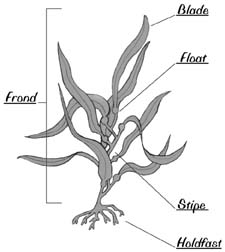| Forests
Off
the coast of California, real forests can be found in the Pacific waters.
These plants found here are called Giant Kelp. One plant can grow to 125
feet in length.
Kelps are large brown seaweed found in temperate oceans
around the world. However, kelps found on the Atlantic coast of the U.S.
are much smaller than those found in the Pacific waters.
(external link): Monterey
Bay Aquarium's Kelp Cam Live!
What is seaweed?
The great bulk of marine life, to include seaweed, is
made of algae (singular alga). Algae is a diverse group of non-vascular
plants. This means that they do not have roots, stems, leaves or flowers,
although they have similar looking structures.
Kelp Parts
 Blade
- leaf-like structure that use the sun's energy for photosynthesis Blade
- leaf-like structure that use the sun's energy for photosynthesis
Stipe - stem-like structure
Float - air filled bladder at the base
of each blade that keeps the plant up toward the surface as it gathers
light for photosynthesis
Frond - the part which holds the plant
to the ocean floor -- it is like a root, but does not supply water and
nutrients to the rest of the plant.
Holdfast - Unlike a root, the kelp's
holdfast doesn't supply water and nutrients to the rest of the plant. A
holdfast keeps algae in place so currents and tides don't wash the organism
away. |
Layers of the Forest
A kelp forest is much like a forest on the land. It can
be divided into layers based on the kind of animal life found there.
The top layer of a kelp forest is called the canopy and
most animal life can be found here. You'll find lots of seabirds, schools
of fish, and marine mammals in or near the canopy. Of course, some of these
animals, also use other parts of the forest, too. Birds, like cormorants,
dive into the water to hunt for food among the fronds. Sea otters swim
to the ocean floor to search for abalone.
In the middle of the kelp forest, you'll find snails and
other marine organisms on the blades and stipes. Many kinds of fish swim
among the fronds, too.
Each kelp strand is attached to the ocean floor by its
holdfast. Here, you'll always find sea urchins and brittle stars.
Are the Giant Kelp forests harvested?
You bet! Algin, a gel-like substance from kelp is used
in products from adhesives to dairy to pharmaceutical products. Take a
look in a health food store! You'll find Kelp is sold as a salt substitute
and as a source of Vitamin C.
| Disclaimer |
Copyright © 2002 Missouri
Botanical Garden
|
 |
|

